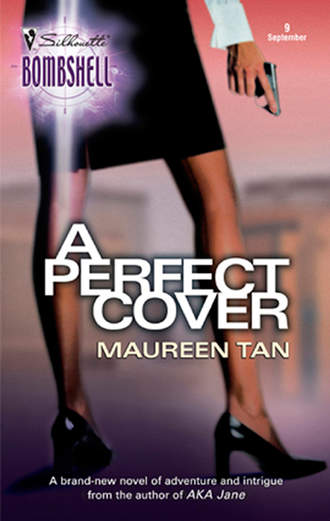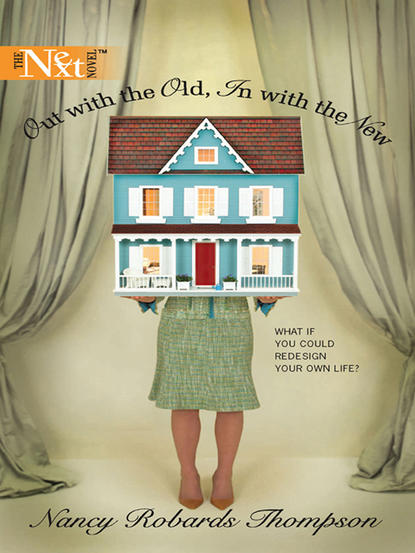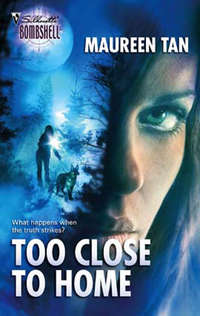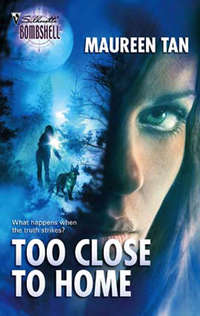
Полная версия
A Perfect Cover
“Hey, boss. Where y’at?” he said.
It was a warning, I thought, for the rest of the staff.
There were dozens of men and women working throughout the bustling maze of a kitchen, but certainly everyone within easy eyeshot of me and my uncle suddenly became more efficient. A group of young women stopped chattering in Spanish, glanced our way, then continued arranging a colorful assortment of baby greens into dozens of small salad bowls. A redheaded woman who I recognized from previous visits as a hostess and a black grill chef with a heavy Cajun accent were distracted from an argument that seemed more domestic than business. A tall, thin woman wielding a pastry bag paused briefly, flashed us a quick smile, then continued scolding two assistants who, like her, were dropping quarter-size blobs of dough onto large baking sheets.
Then, from an adjacent storage room, a boy with Asian features, large ears and a bad complexion came into the kitchen. He was, I guessed, no older than sixteen and dressed in baggy pants and a sleeveless black net shirt that showed off lean, muscular arms and a six-pack. His straight black hair was streaked with hot pink and brilliant blue, and his nose, lip and ears were pierced in a dozen places.
He had shadows under his eyes and the look of someone who was chronically tired, chronically stressed. The look, I thought, was familiar. And though he was far too young, I realized that his drawn, exhausted face brought to mind at least a dozen of the boys I’d played with when I’d lived in the refugee camp.
The boy balanced a fifty-pound burlap sack of onions on one of his shoulders. He was moving slowly beneath its burden when he turned into the narrow aisle between two stainless-steel counters and noticed Uncle Tinh and me. Abruptly he straightened his back and quickened his pace. Unfortunately the top of the sack wasn’t completely sealed and his abrupt movements shifted its load. Dry red onions began tumbling to the floor. Startled, the boy took a half step forward to maintain his balance, put his foot down on one of the escaped onions and fell sprawling between the counters.
In the moment that it took the kitchen staff to recover from the sudden chaos, Uncle Tinh was on his knees at the teenager’s side. As everyone looked on, he helped the boy to his feet and waited as the boy turned his head left, then right and flexed his arms and legs. Once he had proved himself uninjured, Uncle Tinh patted him on the shoulder and leaned in close.
“Di dau ma voi ma vang,” he murmured quietly. “Ma vap phai da, ma quang phai giay.”
I was probably the only other person in the kitchen who heard and understood what Uncle Tinh said. The old Vietnamese proverb cautioned against reckless haste. Loosely translated, it meant “hurry up slowly.” The boy listened with eyes downcast and nodded.
“Then back to work, Tommy,” Uncle Tinh said as he slapped the boy’s back in a very un-Vietnamese-like gesture.
Vin, who had served us dinner upstairs, would have been terrified by such close interaction with his employer. But when Tommy lifted his head, his serious brown eyes, framed by long colorful bangs, looked directly at my uncle.
“Yes, sir,” he said in English, in an accent that was pure New Orleans. “Thank you for your kindness.”
Uncle Tinh watched as the boy began retrieving onions with the enthusiasm of a puppy chasing a roomful of balls. Briefly, a sad smile played across my uncle’s lips, making me wonder if he envied the boy’s youth. Or, perhaps, he was recalling how bittersweet youth could be. In any event, he gave himself a slight shake, stepped back beside me and addressed the entire kitchen.
“Everyone! Maybe you remember my niece, Lacie. She come from way up north to sample Tropicale Vu.”
The tall, thin pastry chef’s head bobbed appreciatively as she shoved the first sheet full of pastry into a waiting oven, then took the next sheet from the waiting hands of one of her assistants. Uncle Tinh snatched a clean apron from a peg, a tall chef’s hat from a shelf and a copper sauté pan from an overhead pot rack. Then he, too, went to work.
I found an empty stool in a relatively quiet corner, took my drawing pad from my briefcase and relaxed as I waited by filling a page with quick sketches of the kitchen staff. Then I turned the page and did a larger drawing of the boy, Tommy. Pimples, big ears, piercings and all. He had good bone structure, I thought, and nice eyes. Once his complexion cleared and he grew up a bit…
“Finis!” Uncle Tinh announced from across the kitchen, so I quickly put my drawing pad away. When I had more time, I promised myself, I would draw the teenager not as he was, but as he would be.
A short time later, Uncle Tinh and I sat together at a small round table just outside the kitchen door, and he watched eagerly as I sampled his creation. Colorful, delicate and bursting with flavor and texture, the dessert involved tiny pieces of tropical fruit encased in a crackling sugar glaze, ribbons of white chocolate, macadamia nuts and custard, and thin, round layers of buttery crust.
Like so many of Uncle Tinh’s hallmark dishes, this one, too, was a dramatic and sophisticated blend of France, Vietnam and New Orleans. It was heavenly and would undoubtedly become a favorite among those who took good food for granted. I told Uncle Tinh just that.
As I finished off the last of the dessert, I listened as members of his staff came to my uncle for instruction and resolution of problems. Nothing about the conversations reflected anything but business as usual in a successful restaurant.
Then I returned our conversation to a far less savory business.
“So Beauprix told you about the murders and he asked you for help.”
“Yes. But I was already considering calling you because of a…related…situation.” Uncle Tinh shook his head. “If you were a stranger, I would have called sooner. But to ask such a favor of someone you care for—”
That thought was interrupted by Tommy, who approached the table confidently.
“Excuse me, sir,” he said, his polite manner at odds with the rebelliousness his appearance suggested. “The pastry chef says the raspberries that were delivered earlier are unacceptable. The top layer looked fine, but beneath that the berries are spoiled.”
“Tell her— No, I will tell her that we will no longer use that supplier. In the meantime, ask the cashier for some cash, drive quickly to the Market and obtain for us the quality we need. Can you do that, Tommy?”
Tommy nodded enthusiastically, then left on the errand.
“He is the first in his family born in America,” Uncle Tinh said. “A hard worker in a land of opportunity. I think he will do well.”
Then he waved his hand in the direction of the nearby hostess. She scurried to refill our coffee cups. Uncle Tinh waited until she was out of earshot before speaking again.
“I know you do dangerous work, Lacie. But I would not have called you if there were another option. No matter how competent you are now, my heart still sees the child you were. Perhaps that is why I am comforted that you have Anthony Beauprix as an ally. Working with another professional makes the situation safer. It made my decision to call you easier.”
I was not surprised by Uncle Tinh’s attitude, nor did I argue about whether or not I needed Beauprix. Though I often worked alone, I had never objected to having someone competent watching my back. And although I found his attitudes annoying, I had no doubt that Beauprix was competent.
“Tell me what you would have me do that the police cannot,” I said.
He nodded.
“A man in my position hears rumors—and receives information—from many sources. I have already told Anthony what I am now telling you. A gang has taken over Little Vietnam, intimidating the merchants, as well as the residents. Many business owners now pay protection.”
I told myself that if my uncle was himself the head of a criminal organization, he would have the resources to deal with this threat. But the moment of comfort I took from that thought might have been longer if I’d had less knowledge of immigrant gangs. It was too easy to remember that, less than a decade earlier, the well-entrenched criminal establishment in New York’s Chinatown had been shaken to its roots by the invasion of a psychopathic gang called the Born to Kill.
“Protection only?” I asked, pushing Uncle Tinh for answers to questions he didn’t know I had. “Or other activities? Like smuggling illegals? Or perhaps supplying them with documents?”
Uncle Tinh’s tone was bland and, when his dark eyes met mine, his gaze was unwavering.
“Like all gangs, they engage in whatever is profitable. Certainly, counterfeiting documents and smuggling illegals are profitable. As are drugs, gambling and prostitution. Profitability also provides a ready motive for one murder. Or three. Or a dozen.
“These are violent, dangerous individuals, Lacie. Treat them with caution. With the information I have given him, even a white policeman might eventually be able to gather evidence against some of the sai lows—the foot soldiers. But to stop this gang from poisoning the Vietnamese community with their violence? To solve three murders and prevent others?”
Uncle Tinh put his coffee cup down, reached across the table and took each of my hands in one of his.
“To destroy the viper, one must have the skill and courage to cut off its head.”
And that, it seemed, was my job.
Not too much later, I left Tinh’s City Vu.
With an eye to the calories I’d just consumed, I decided to walk back to the Intercontinental. It was late afternoon, a breeze stirred the damp air and the drizzle that had plagued the city on and off for days had stopped. But, wary of more autumn showers, I borrowed one of the big, black courtesy umbrellas emblazoned with the restaurant’s logo that my uncle kept on hand for the restaurant’s regular patrons. Then I stood beneath the canopy that sheltered the entrance of Tinh’s City Vu from rain and sun and considered my route.
To my left, at the bottom of Ursulines Avenue, was the historic and very commercial French Market. Seven days a week, twenty-four hours a day, merchants sold everything from Creole tomatoes by the pound to fine jewelry by the carat. From the Market, I could wander along the wooden promenades and admire the commerce along the Mississippi.
The lure of sweet pralines, thick chicory-laced coffee and a view of river traffic navigating the crescent bend usually made the Market and the Moonwalk my inevitable choices. But I’d already had my fill of sweets, was too wired to need caffeine and was in no mood to stroll along the river. So I turned right, in the direction of the Royal Pharmacy, aiming to surround myself with the carefree, frenzied energy of Bourbon Street.
It was Friday and, like Uncle Tinh’s place, the French Quarter’s bars, restaurants and strip joints were gearing up for a busy night. Tourists and locals already filled the wide sidewalks, second-floor balconies and narrow streets of the Quarter. But an hour before dark, most were more interested in food and atmosphere than in getting plastered or watching topless dancers bump and grind.
The music, which was what I sought, was already beginning to flow from the clubs. Old tunes and new washed over Bourbon Street—jazz and Dixieland, rhythm and blues, soul and funk, Cajun and zydeco. I walked for blocks and took my time, letting the crowd pass unnoticed as I lingered in open doorways, inhaling the mixed odors of food, cigarettes and booze, and listening. Just listening.
On the streets of New Orleans, tradition and impulse, beauty and corruption, good and evil, coexisted and sometimes embraced. And the city felt more like home than any place I had ever been.
A rumble of thunder announced the downpour. Tourists clapped their palms over the tops of their alcohol-filled go-cups and ran for shelter. I opened my umbrella and stepped from the wide, brick sidewalk into the narrow brick-paved street to avoid the people congregating under overhangs and in doorways.
From beneath my portable shelter, I gauged my progress. It was nearly dusk. I had already walked past the double balconies and dormer windows of the Royal Sonesta Hotel and could no longer hear the piano and its accompanying male voice coming from inside the Desire Oyster Bar. Ahead of me, glowing through the rain and reflecting off the wet street, was the iron-work-framed, black-and-white sign of the Old Absinthe House. From there, I knew, it was just two blocks to Canal Street and then three more blocks to the Intercontinental.
Half a block past the Old Absinthe House and I was alone on the street. I stepped back onto the sidewalk, which was now cracked concrete rather than picturesque red brick. Even in good weather, tourists rarely bothered walking this far along Bourbon Street. There were few clubs, restaurants or bars to draw them. Despite that, the Quarter’s characteristic smell of mildew, beer, vomit and urine wafted from the doorways, alleys and parking lots. But unlike the area frequented by tourists, here the litter of discarded go-cups was joined by the jagged green, brown and clear-glass remains of discarded liquor bottles and occasional used needles. It was a reminder of the area’s potential for unsavory night life. Once the sun set, anyone walking alone invited trouble.
Despite the rain, enough daylight remained that I wasn’t particularly concerned about my safety. But with no reason to linger, I walked briskly, my thoughts focused on a hot shower, soft towels and something warm from room service.
At the intersection of Bourbon and Iberville, I glance both ways, looking for traffic that wasn’t there, then kept my eyes on the pavement as I stretched my legs to avoid potholes and the rush of dirty water through the gutters on either side of the street. I’d just stepped back onto the sidewalk and was walking past the boarded-up, vomit-stained entry to a crumbling brick building when I heard a distressed, muffled cry.
The sound came from behind me. I turned around, saw nothing but empty street and sidewalk, and stood, head tipped to one side, straining to hear beyond the sounds of the rain hitting my umbrella. I took another step in the direction of Bourbon and Iberville and heard the sound again. This time, more distinctly.
“Help!”
It was a male voice, stretched and urgent.
I hurried forward.
Suddenly a man lunged at me from around the corner of the building, reaching for me with grasping, gloved hands. But his timing was off and he had misjudged not only the distance separating us but his intended victim. His bad judgment gave me enough time to swing my open umbrella between us and thrust it, hard, at his face. When he stepped back to avoid the metal point at the umbrella’s center, I abandoned it, spun on my heel and sprinted away.
I’d only had a glimpse of my pursuer, but that had been enough to terrify. He wore a black-hooded jacket and a mask, the kind that was available in nearly every tourist shop in the Quarter. Except for slitted eyeholes, it covered his entire face with glossy black feathers.
I ran as fast as I could up Bourbon Street, spurred on by the footsteps behind me. I hung on to my briefcase, mostly because it didn’t occur to me to let it go, and my purse bounced against my body from the strap that hung from my shoulder.
I considered screaming, shouting for help, but couldn’t spare the breath until I was closer to a place where my cries were likely to be heard. Impossible, too, to dig my cell phone from my purse without breaking my pace.
Between me and the lights and traffic on Canal Street was almost a full block of boarded-up businesses, vacant storefronts and narrow, solidly locked entries to a handful of upstairs apartments. I vaguely remembered that there was a Greek restaurant near the end of the block, but I wasn’t certain if it was still open. Even if it was out of business, there were always people waiting just across Canal at the “zero stop” for the St. Charles streetcar line.
My pursuer was no runner. I spared him only a single over-the-shoulder glance, realized that the distance between us was growing, and then kept my attention focused on the lights that marked the distant intersection. Only half a block, I told myself. I could make it easily. And then I would be safe.
As I passed the cavernous entrance to a long-defunct topless bar, a second man stepped out directly in front of me, blocking the sidewalk. He, too, wore a feathered mask. It was crimson.
I swung my briefcase, hard, in his direction as I swerved around him, into the street and kept running.
He was fitter and faster than the first man. A few steps later he caught up with me. His heavy blow between my shoulder blades sent me to the ground. I landed in the gutter, ended up with my back against the curb. I tried to roll, but my long, loose hair betrayed me. My attacker stepped on it, trapping me.
Trying to protect myself from further blows, I curled my hands over my head and kept my forearms pressed tightly against my face. I lay there, gasping for breath, as cold water rushed around me, soaking my linen jacket and dress.
A rush of footsteps and harsh breathing announced the arrival of the other man. The man in the crimson mask leaned forward, grabbed my wrists and wrenched my hands away from my face. Then he straightened and stepped backward, freeing my hair as he pulled my arms over my head, lifting my upper body out of the gutter. I felt the rushing water tugging at the ends of my hair.
My captor was standing so that I couldn’t reach him. But I fought anyway, trying to free my wrists from his unyielding grip. I bucked, kicked, twisted wildly, screamed at the top of my lungs. All the while, the man in the black mask remained on the sidewalk, his hands shoved deep into raincoat pockets, watching me struggle.
Конец ознакомительного фрагмента.
Текст предоставлен ООО «ЛитРес».
Прочитайте эту книгу целиком, купив полную легальную версию на ЛитРес.
Безопасно оплатить книгу можно банковской картой Visa, MasterCard, Maestro, со счета мобильного телефона, с платежного терминала, в салоне МТС или Связной, через PayPal, WebMoney, Яндекс.Деньги, QIWI Кошелек, бонусными картами или другим удобным Вам способом.






